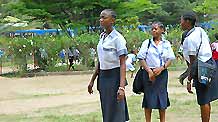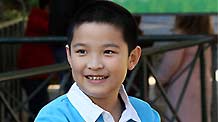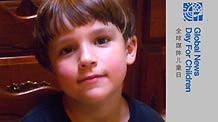Bare-foot Doctors Bring Gift of Life in China's Child Vaccine Chain
Adjust font size:
Guo Hong is a doctorate student in computer science -- but to his parents, he's just "Doggy."
It's a nickname that's given the 26-year-old cause to cringe over the years. "It embarrassed me when my parents called me that in front of my girlfriend."
In rural China, parents have traditionally called their newborns inappropriate names, such as Doggy, Smelly or Fool, in the belief that it will confer long life and deter evil spirits from haunting their offspring.
It's a tradition rooted in a long history of high child death rates.
When People's Republic of China was founded in 1949, one in five children died before their fifth birthday, according to a progress report by the Ministry of Health
But these days, the necessity for crude nicknames is receding.
According to "The State of the World Children 2009" report by the United Nations Children's Fund (UNICEF), the under-5 mortality rate in China was down to 22 per 1,000 in 2007.
The rate of children who die before the age of 5, is a major indicator of child health, as well as a measure of progress in the United Nation's Millennium Development Goals (MDGs).
Dr Robert Scherpbier, medical officer in the Maternal and ChildHealth unit of the World Health Organization (WHO) China, says the WHO believes that China's under-5 mortality rate is among the lowest in the western Pacific region.
One of the main reasons for this is the immunization program launched by Chinese government in 1978, which has seen China's children immunized against five communicable diseases -- measles, polio, tuberculosis, tetanus, pertusis (whooping cough) and diphtheria -- all major threats to child survival.
"China's expanded program on immunization (EPI) is the largest in the world. It targets a birth cohort of 16 million children," says Scherpbier.
However, progress is uneven. Dr Yin Yin Nwe, UNICEF representative to China, said in March that infant and child mortality was almost 2.7 times higher in the western than eastern regions, 2.4 times higher in rural than urban areas, and five times higher in the poorest rural counties than in large cities.
The poorest rural counties are in dire want of health facilities, health professionals, and sound hygiene practice. Someremote and mountainous areas are inaccessible to modern transport.
In such places, it's the so-called "bare-foot doctors" who take vaccines to each rural household with children.
"Bare-foot doctors" are village-level medical workers who usually do not have professional training. Mostly without clinics, they travel their areas on foot -- hence the name bare-foot doctors -- making house calls.
Bare-foot doctor Yang Zheng'e, 46, is a specialist in maternal and child health in the clinic of Jiarong Township, Huishui County, of the southwestern Guizhou Province.
In 1987, Yang became the only maternal health specialist in the township with a population of 15,000 in 3,000 households. The township was poverty-stricken, with annual per capita GDP of 2,398yuan (US$351.14). Her salary was 38 yuan per month then.
She began practicing after being trained for a year in nursing school where she learned the basics of medicine from scratch.
The 3,000 households are scattered in a mountainous area of 98 square kilometers. It takes her four to five hours walking, including crossing several streams, to reach the farthest household.
"The shoes I've worn out were countless." she says.
Yang carries a 15-kilogram load on her 40-kilogram frame: a cool box and a medicine box, containing ice, vaccines, iodine, a stethoscope, salt water and bandages and other necessities.
The cool box is a must for vaccinations. At the very beginning of the immunization program, the program was hampered by the absence of a refrigeration chain, which rendered many vaccines ineffective.
Since 1981, the Ministry of Health has worked with UNICEF and the WHO to install a refrigeration system to cover 90 percent of the population.
The project provided walk-in fridges, chest refrigerators, refrigerated trucks and cool boxes to improve the storage and transportation of vaccines for children below the age of 6.
Children have mixed feelings toward cool boxes, which contain candies as well as needles, says Yang Zheng'e.
In her township, the health threats to children include communicable diseases such as measles and meningitis, Measles, in particular, can lead to complications such as child pneumonia, blindness and other infections.
Since 2000, the incidence of child measles in Jiarong County has been zero. Yang Tingchang, office director of Huishui Health Bureau, says," Diseases preventable by vaccines are almost unheard of in Jiarong township."
Around 96 percent of children in Jiarong Township were vaccinated against tuberculosis and hepatitis B, said Yang.
Hepatitis B vaccinations were introduced to the EPI in 2002. After expansions in 2002 and 2007, the program comprises 15 vaccines, which are all manufactured in China and provided for free.
In 2008, reported coverage for basic WHO recommended vaccines was above 95 percent, according to the WHO.
"China even immunizes children against diseases that few countries in the world manage to address, such as hepatitis A and meningitis groups A and C," says Dr Yvan Hutin, medical officer in WHO China's EPI.
He says surveys conducted in 1992 and 2006 indicated that in 2006, hepatitis B infection in children aged under 5 had fallen by about 90 percent.
"This decrease is attributed to high vaccination coverage and delivery of hepatitis B vaccines within 24 hours of birth," says Dr Hutin. He cites the elimination of the transmission of polio in1992, thus protecting kids from illness and paralysis, as another EPI achievement.
Yang Zheng'e is better-off than when she started. In 2008, her monthly salary was raised from 38 yuan to 100 yuan. With a bonus factored in, she can earn more than 1,000 yuan a month.
But this bare-foot doctor says she would keep stepping up regardless to ensure all 2,700 children in Jiarong Township are free of disease.
(Xinhua News Agency November 20, 2009)





